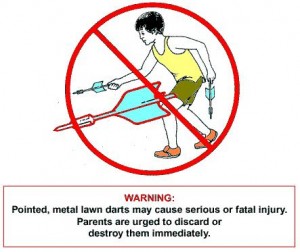Effective December 19, 1988, all lawn darts were banned from sale in the United States. (For those too young to to be familiar with lawn darts, the game consisted of throwing large darts toward a round target that was laying on the ground.) According to the Consumer Product Safety Commission (CPSC), the game resulted in the deaths of three children.
At the time lawn darts were banned, one CPSC Commissioner said, ”What limited recreational value lawn darts may have is far outweighed by the number of serious injuries and unnecessary deaths.” Recreational value to whom? While the CPSC may see only a “limited recreational value” in lawn darts, what of those who enjoyed the game and played it responsibly? Their judgment and their values were overridden by the judgment and values of the CPSC.
Of course, the CPSC “justified” this government coercion by citing some “public interest”–the lives that would be saved. But every product and activity poses risks. Misusing or abusing any product can cause injuries or death. For example, according to the CPSC:
- Three hundred children under the age of five drown in swimming pools each year (CPSC page)
- More than 275 young children have drowned in buckets since 1984 (CPSC page)
- Since 1973, more than 110 children have died as a result of suffocation involving uninflated balloons or pieces of balloons (CPSC page)
These deaths, like those resulting from lawn darts, are tragic. But why isn’t the CPSC banning swimming pools, buckets, and balloons? After all, their use has killed far more children than lawn darts ever did. For that matter, why doesn’t the CPSC simply ban water?
Most likely, the CPSC would claim that banning swimming pools, buckets, and balloons would be impractical. The benefits of these products outweigh the injuries and deaths that result from their use. In other words, the CPSC will determine which products pose an unacceptable risk and which do not. Your judgment on the matter is irrelevant. This is the ultimate consequence of all government regulations: Your choices and actions are limited, controlled, and restricted.
Admittedly, the ban on lawn darts did not destroy the economy. But what of those who made a living manufacturing and selling lawn darts? Their livelihood suddenly became illegal. Their economy was destroyed. This too is the ultimate consequence of all government regulations: The lives of individual human beings are harmed, sometimes irreparably.
Any number of arguments might be offered to “justify” such actions, but they all come down to one thing: The individual must sacrifice his self-interest for the “public interest.” The manufacturer must sacrifice his well-being and his business. You must sacrifice your enjoyment because the CPSC has ruled that lawn darts have “limited recreational value.”
The solution to misuse of products is not government intervention. The solution is personal responsibility. Those who misuse or abuse a product should be held accountable for their actions. And the rest of us should be free to produce and purchase the products of our choice.
